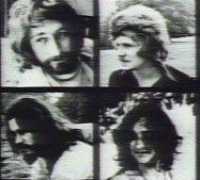Formed London, 1969; disbanded 1971; re-formed 1973; disbanded 1988; re-formed 1997.
Back in 1969 Richard Davies met Dutch millionaire Stanley August Miesegaes (commonly known as Sam) in Munich whilst playing in a band called The Joint. He offered to sponsor Davies if he formed a new group and Davies duly put together line-up (A) after advertising for players in a rock music paper. The new group was originally going to be named Daddy but at Winthorp's suggestion it took its name from W.H. Davies' book, 'The Autobiography Of A Supertramp', published in 1910. Their first album, Supertramp, made little impact when released in 1970. It was full of lengthy and uninteresting solos and Bob Miller suffered a nervous breakdown soon afterwards.
The band regrouped in 1971 with new members Currie and Farrell and original bassist Hodgson switched to lead guitar. Their second album Indelibly Stamped fared no better than the first and after their sponsor Sam paid off ?0,000 worth of debts, all the band members quit except for Davies and Hodgson.
A new line-up (C) was put together. Helliweg and Thompson had both played with The Alan Bown Set previously. Bob Siebenberg (also known as C. Benberg) had been with Bees Make Honey. In a make or break gambit A&M installed the group in Southcombe (a farmhouse in Somerset) and assigned first rate producer Ken Scott to work with them. The resulting album, Crime Of The Century, a semi-concept affair, excellently produced, brought them into the big time. It developed what became a distinctive electric piano rhythm-based sound epitomised by Dreamer, which was taken from the album, put out on 45 and peaked at No 13 in the UK. In the US (Bloody Well Right) the flip side to Dreamer in the UK made it to No 35. The follow-up Crisis? What Crisis was very similar in style and achieved a comparable level of success. It also climbed to No 44 in the US.
Indeed as we reach the end of 1976 the band's best days were still to come.
In 1977, with punk's chill wind declaring death to the dinosaurs, Supertramp engaged famed Beatles engineer Geoff Emerick for Even In The Quietest Moments (1977). Their last half-decent album, it provided a US Top 20 hit with an uncharacteristically restrained acoustic song, "Give A Little Bit". Normal prog-rock service was resumed with "Babaji" (lost-little-boy spiritualism) and "Fool's Overture", in which Davies duetted with Winston Churchill.
Breakfast In America was their magnum opus spawning no less than four hit singles.
However, the formula was maintained, with slowly diminishing returns, on Famous Last Words (1982) (after which Hodgson jumped ship), Brother Where You Bound (1985) and Free As A Bird (1987). The last release was Live '88 (1988), which, in comparison with the hugely successful and much better Paris (Live 29.11.79) (1980) seemed to sum up the band's decline.
You'd be hard pushed to portray Supertramp as being in any way influential; although they readily fused sound effects, nursery rhymes and out-of-context radio footage, it's forcing the point to hail them as precursors of the sampling age. But, alongside others, notably 10CC and Queen, they serve as a good example of that curious hybrid of melodic prog-rock that flourished between the genuine heavyweights of the 60s and late 70s.
Mark Hart, formerly in "Crowded House," joined Supertramp in 1997 on keyboards and vocals. Supertramp's 1997 CD, "Some Things Never Change" was a more successful effort, artistically and commercially, than their output in immediate post-Hodgson years, and reflects the blues and jazz influences of Rick Davies and John Helliwell more strongly than their earlier hits (penned by Hodgson). Other additions to the band's lineup are Cliff Hugo on bass, (replacing the band's original bassist, Dougie Thomson), Carl Verheyen on guitar, and Lee Thornburg on trumpet. They enjoyed a successful tour in support of that CD release. After another hiatus, Supertramp has just released a new CD, "Slow Motion," and have just finished a six month, 2002 tour of Europe and Canada with a few US appearances.
Roger Hodgson has pursued a solo career, with four CD releases since his departure from Supertramp, and has toured both as a solo performer and with band support. He has also been involved in a variety of artistic projects, including the album "Talk" by Yes, the 1998 "Night at the Proms" concert, a collaboration with Carlos Nunez, the "Excalibur" project by Alan Simon in 2000, and the 2001 tour with Ringo Starr.
